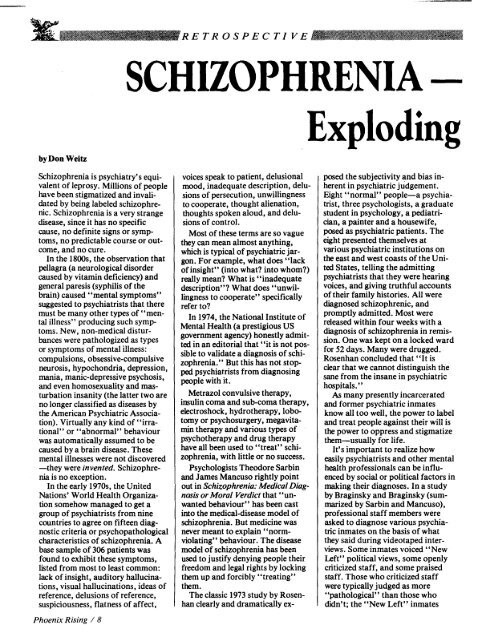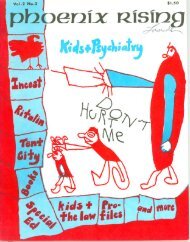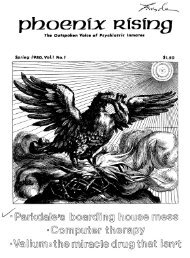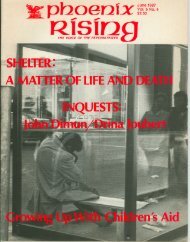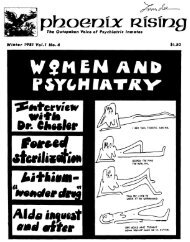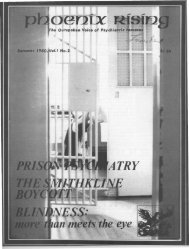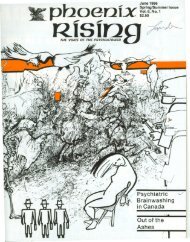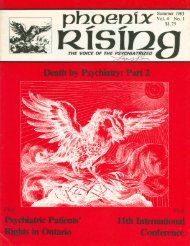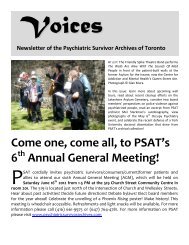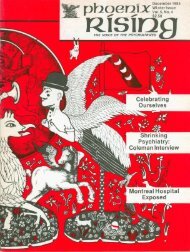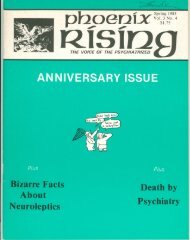Phoenix Rising - Psychiatric Survivor Archives of Toronto
Phoenix Rising - Psychiatric Survivor Archives of Toronto
Phoenix Rising - Psychiatric Survivor Archives of Toronto
Create successful ePaper yourself
Turn your PDF publications into a flip-book with our unique Google optimized e-Paper software.
RETROSPECTIVE<br />
SCHIZOPHRENIA<br />
by Don Weitz<br />
Exploding<br />
Schizophrenia is psychiatry's equivalent<br />
<strong>of</strong> leprosy. Millions <strong>of</strong> people<br />
have been stigmatized and invalidated<br />
by being labeled schizophrenic.<br />
Schizophrenia is a very strange<br />
disease, since it has no specific<br />
cause, no definite signs or symptoms,<br />
no predictable course or outcome,<br />
and no cure.<br />
In the 1800s, the observation that<br />
pellagra (a neurological disorder<br />
caused by vitamin deficiency) and<br />
general paresis (syphilis <strong>of</strong> the<br />
brain) caused "mental symptoms"<br />
suggested to psychiatrists that there<br />
must be many other types <strong>of</strong> "mental<br />
illness" producing such symptoms.<br />
New, non-medical disturbances<br />
were pathologized as types<br />
or symptoms <strong>of</strong> mental illness:<br />
compulsions, obsessive-compulsive<br />
neurosis, hypochondria, depression,<br />
mania, manic-depressive psychosis,<br />
and even homosexuality and masturbation<br />
insanity (the latter two are<br />
no longer classified as diseases by<br />
the American <strong>Psychiatric</strong> Association).<br />
Virtually any kind <strong>of</strong> "irrational"<br />
or "abnormal" behaviour<br />
was automatically assumed to be<br />
caused by a brain disease. These<br />
mental illnesses were not discovered<br />
-they were invented. Schizophrenia<br />
is no exception.<br />
In the early 1970s, the United<br />
Nations' World Health Organization<br />
somehow managed to get a<br />
group <strong>of</strong> psychiatrists from nine<br />
countries to agree on fifteen diagnostic<br />
criteria or psychopathological<br />
characteristics <strong>of</strong> schizophrenia. A<br />
base sample <strong>of</strong> 306 patients was<br />
found to exhibit these symptoms,<br />
listed from most to least common:<br />
lack <strong>of</strong> insight, auditory hallucinations,<br />
visual hallucinations, ideas <strong>of</strong><br />
reference, delusions <strong>of</strong> reference,<br />
suspiciousness, flatness <strong>of</strong> affect,<br />
<strong>Phoenix</strong> <strong>Rising</strong> /8<br />
voices speak to patient, delusional<br />
mood, inadequate description, delusions<br />
<strong>of</strong> persecution, unwillingness<br />
to cooperate, thought alienation,<br />
thoughts spoken aloud, and delusions<br />
<strong>of</strong> control.<br />
Most <strong>of</strong> these terms are so vague<br />
they can mean almost anything,<br />
which is typical <strong>of</strong> psychiatric jargon.<br />
For example, what does "lack<br />
<strong>of</strong> insight" (into what? into whom?)<br />
really mean? What is "inadequate<br />
description"? What does "unwillingness<br />
to cooperate" specifically<br />
refer to?<br />
In 1974, the National Institute <strong>of</strong><br />
Mental Health (a prestigious US<br />
government agency) honestly admitted<br />
in an editorial that "it is not possible<br />
to validate a diagnosis <strong>of</strong> schizophrenia."<br />
But this has not stopped<br />
psychiatrists from diagnosing<br />
people with it.<br />
Metrazol convulsive therapy,<br />
insulin coma and sub-coma therapy,<br />
electroshock, hydrotherapy, lobotomy<br />
or psychosurgery, megavitamin<br />
therapy and various types <strong>of</strong><br />
psychotherapy and drug therapy<br />
have all been used to "treat" schizophrenia,<br />
with little or no success.<br />
Psychologists Theodore Sarbin<br />
and James Mancuso rightly point<br />
out in Schizophrenia: Medical Diagnosis<br />
or Moral Verdict that "unwanted<br />
behaviour" has been cast<br />
into the medical-disease model <strong>of</strong><br />
schizophrenia. But medicine was<br />
never meant to explain "normviolating"<br />
behaviour. The disease<br />
model <strong>of</strong> schizophrenia has been<br />
used to justify denying people their<br />
freedom and legal rights by locking<br />
them up and forcibly "treating"<br />
them.<br />
The classic 1973 study by Rosenhan<br />
clearly and dramatically exposed<br />
the subjectivity and bias inherent<br />
in psychiatric judgement.<br />
Eight "normal" people-a psychiatrist,<br />
three psychologists, a graduate<br />
student in psychology, a pediatrician,<br />
a painter and a housewife,<br />
posed as psychiatric patients. The<br />
eight presented themselves at<br />
various psychiatric institutions on<br />
the east and west coasts <strong>of</strong> the United<br />
States, telling the admitting<br />
psychiatrists that they were hearing<br />
voices, and giving truthful accounts<br />
<strong>of</strong> their family histories. All were<br />
diagnosed schizophrenic, and<br />
promptly admitted. Most were<br />
released within four weeks with a<br />
diagnosis <strong>of</strong> schizophrenia in remission.<br />
One was kept on a locked ward<br />
for 52 days. Many were drugged.<br />
Rosenhan concluded that "It is<br />
clear that we cannot distinguish the<br />
sane from the insane in psychiatric<br />
hospitals.' ,<br />
As many presently incarcerated<br />
and former psychiatric inmates<br />
know all too well, the power to label<br />
and treat people against their will is<br />
the power to oppress and stigmatize<br />
them-usually for life.<br />
It's important to realize how<br />
easily psychiatrists and other mental<br />
health pr<strong>of</strong>essionals can be influenced<br />
by social or political factors in<br />
making their diagnoses. In a study<br />
by Braginsky and Braginsky (summarized<br />
by Sarbin and Mancuso),<br />
pr<strong>of</strong>essional staff members were<br />
asked to diagnose various psychiatric<br />
inmates on the basis <strong>of</strong> what<br />
they said during videotaped interviews.<br />
Some inmates voiced "New<br />
Left" political views, some openly<br />
criticized staff, and some praised<br />
staff. Those who criticized staff<br />
were typically judged as more<br />
"pathological" than those who<br />
didn't; the "New Left" inmates


